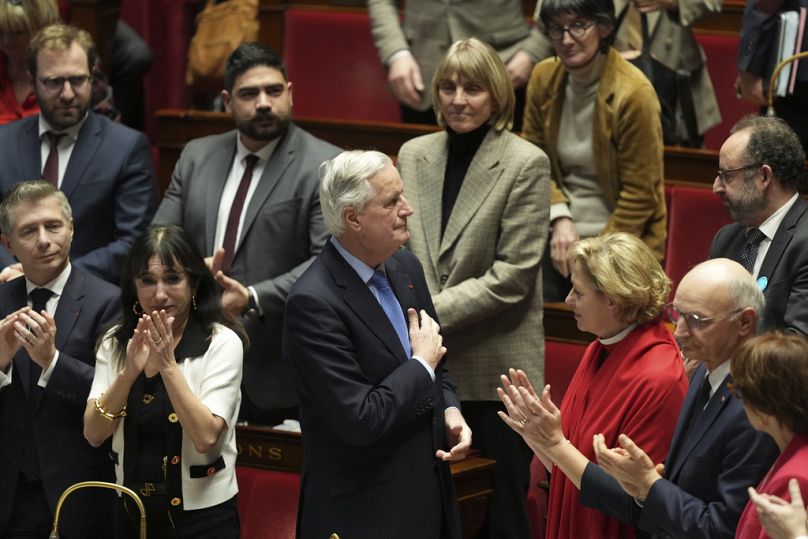The French leader will meet with parties on the left and right in an attempt to form a new government after his minority government was toppled in a no confidence vote Wednesday evening. Marine Le Pen's far-right National Rally will be notably absent.
French President Emmanuel Macron will meet political leaders from the left and right on Friday morning with the aim of forming a new “government of general interest” after the country’s Prime Minister Michel Barnier was ousted by a no-confidence vote.
The French leader is due to meet with representatives from centrist political parties such as Renaissance, Horizons and the Democratic Movement early Friday morning.
Later in the day, he is expected to meet members of the Socialist party, including First Secretary Olivier Faure, followed by figures from Les Républicains.
Representatives from the far-right National Rally, currently parliament's largest party, and far-right La France Insoumise were notably not invited.
As the country anxiously waits to hear the identity of its new Prime Minister, Macron said he would name Barnier’s replacement “in the next few days.”
“I will ask them to form a government for the general interest,” Macron said of his meetings on Friday.
A new government should represent "every political force within the spectrum of parties destined to govern and that they could join or, at least, agree not to bring it down”.
The announcement is not expected before this weekend, or even by Monday, and it's expected to take more time until the full makeup of the new government is revealed.
Macron refused to accept blame for the collapse of his government in an address on Thursday, instead choosing to blame his opponents.
In a television interview, far-right leader Marine Le Pen expressed doubt that a new government would survive.
"The risk is that if the President of the Republic carries out a new dissolution (of the parliament) from July - or in September or October of next year, we will find ourselves more or less in the same situation."
Leader of La France Insoumise, Jean-Luc Mélenchon, blasted Macron in an interview of his own, saying he failed to acknowledge a "vote for change" after he dissolved Parliament and called for snap legislative elections in June leaving the country's ruling body without a majority.
"France is a very special country. It only changes when it has to," he said, "There was a group that came out on top (of the legislative elections) by a wide margin: the New Popular Front," Mélenchon said, referring to a broad coalition of left-wing parties that came first but still short of a majority.
France’s government collapsed Wednesday evening after Prime Minister Barnier on Monday invoked a rarely used constitutional mechanism to push through the contentious 2025 budget without parliamentary approval, arguing it was essential to maintain “stability” amid deep political divisions.
Yet Barnier’s proposed austerity budget — slashing €40 billion in spending and raising taxes by €20 billion — only deepened divisions, inflaming tensions in the lower house and triggering a dramatic political confrontation.
The move immediately drew a sharp backlash, with both the left and right wing of France’s National Assembly uniting in favour of Wednesday’s no-confidence vote. A total of 331 MPs supported the motion out of 577 total lawmakers. A minimum of 288 votes were needed.
Barnier and other ministers will remain in power to act as a caretaker government until the appointment of new ministers, a statement from the Elysee presidential palace said on Thursday.












